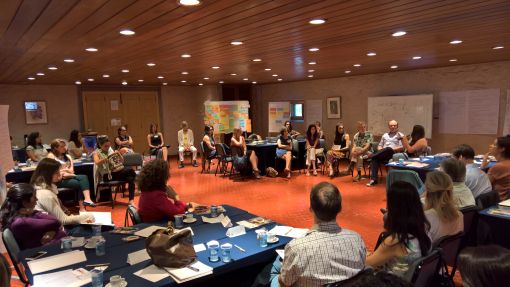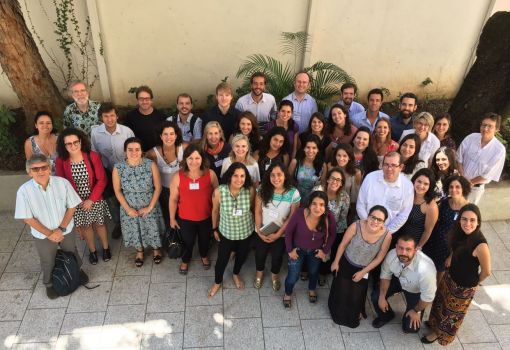According to the United Nations, seven billion people will live in cities by 2050 – twice as many as today. Ensuring that bustling metropolises remain liveable is an enormous challenge. This was the topic discussed by alumni of the Development-Related Postgraduate Courses (EPOS) when they networked at a workshop in Rio de Janeiro.
The workshop was hosted by the German Association of Postgraduate Courses with special Relevance to Developing Countries (AGEP) with support from the DAAD. 37 Latin American alumni from 27 EPOS degree courses attended. They all work in professions that deal with the topic of urbanisation. “But their jobs leave little spare time for fostering networks or participating in opportunities for interdisciplinary training”, says AGEP network coordinator Robin Pass.
For this very reason, the professionals took full advantage of the opportunity to discuss urbanisation in small groups for three days in connection with the topics education and health, housing and slum upgrading, and energy and water supply systems.
New Perspectives
Mobility was also discussed, as it is one of the most important topics facing rapidly growing cities. “We thought about how mobility would have to be structured to benefit all the residents of a city,” reports Robin Pass, who moderated the mobility group. One problem is that often only engineers are responsible for planning the streets, observed Ana Beatriz Nestlehner Cardoso de Almeida, alumna of the master programme “Spatial Planning for Regions in Growing Economies” at the TU Dortmund. Today the Brazilian works as a spatial planner for an institute that wants to create a safe environment for children. “Many sidewalks along busy streets are built far too narrow, making them especially dangerous for children. The perspective of the pedestrian is often missing from the planning concept.”
This is the very perspective that the alumna brought to the workshop. “Streets, sidewalks, intersections, and squares must be interconnected in a way that also enables children, elderly residents and physically challenged people to move about freely and safely.” In order to achieve this, the public must be involved in the planning.
Cornerstone for a Strong Network
Robin Pass shows just how valuable bringing alumni together is with a further example. “An alumnus who advises the Brazilian government on environmental legislation, spoke with another participant about combating illegal landfill sites. The impulses he got by doing so played a significant role in inspiring him to write a draft bill.”
The AGEP coordinator hopes that more such encounters will have a positive impact on professional life. After all, the alumni have learned new approaches that may eventually help them solve problems in their own cities. In addition, they have expanded their professional networks, and that harbours a lot of potential. The wish of the AGEP and the DAAD is that the alumni will continue to expand regional networking on their own.
“For me, the workshop was a complete success”, summarises spatial planner Ana Beatriz Nestlehner. “I understand the challenges facing megacities like Rio de Janeiro better now. And I have new ideas about how we can develop safe and environmentally-friendly mobility for everyone living in urban areas.”







